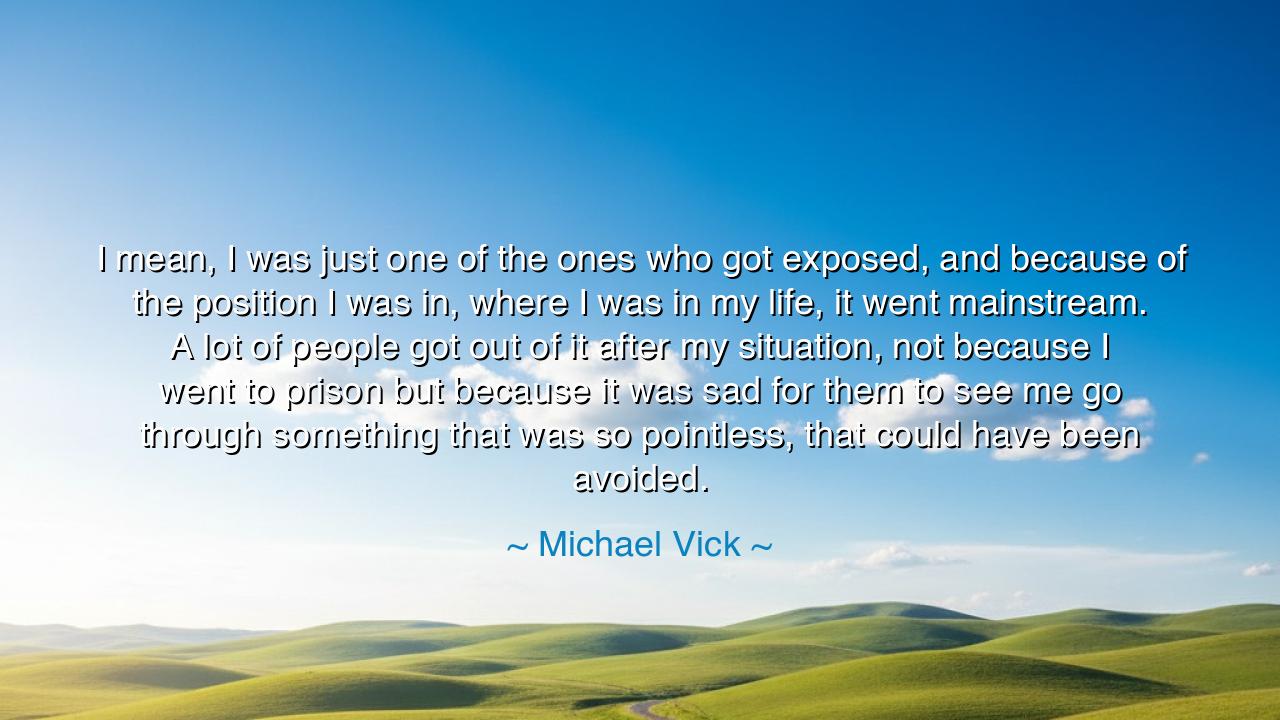
I mean, I was just one of the ones who got exposed, and because
I mean, I was just one of the ones who got exposed, and because of the position I was in, where I was in my life, it went mainstream. A lot of people got out of it after my situation, not because I went to prison but because it was sad for them to see me go through something that was so pointless, that could have been avoided.






Hear the lament of Michael Vick, who spoke with the sorrow of hindsight: “I mean, I was just one of the ones who got exposed, and because of the position I was in, where I was in my life, it went mainstream. A lot of people got out of it after my situation, not because I went to prison but because it was sad for them to see me go through something that was so pointless, that could have been avoided.” In these words, there is not only the regret of one man, but the eternal warning of how choices, once made, can bring down even the mighty. It is the tale of wasted potential, of sorrow that ripples outward, and of lessons learned too late.
The first truth in his words lies in the power of exposure. Many may fall into wrongdoing, but only some are cast beneath the blazing light of public judgment. Vick acknowledges this: he was not the only one, but his position as a man of fame turned his fall into a spectacle. Here lies the ancient paradox of greatness: to rise high is to carry not only glory but also greater peril, for the higher one climbs, the farther one has to fall. His confession shows the burden of visibility—what might be hidden for others becomes magnified for the celebrated.
There is also the recognition of pointlessness. He speaks not of a crime born of necessity, nor of a deed done for survival, but of actions that brought no true gain, only ruin. This is the bitterest sorrow—to look back upon suffering and see it could have been avoided. History is filled with such tragedies. Consider Napoleon’s invasion of Russia: millions suffered, armies perished, an empire weakened—all for a campaign that brought nothing but defeat. Like Vick’s reflection, it stands as a monument to human folly, to choices made without wisdom that lead only to needless loss.
Yet even within his words shines a strange mercy: that others learned from his downfall. He says, “A lot of people got out of it after my situation.” Though his own suffering was heavy, it served as a warning that awakened others to abandon the same destructive path. This echoes the ancient role of the tragic hero, whose fall becomes a lesson for the multitude. The sorrow of one becomes the salvation of many. In this way, Vick’s ruin carried within it the seed of redemption—not only for himself, but for others who turned aside before it was too late.
The quote also reminds us of the human response to suffering. He notes that people turned away, not because he went to prison, but because it was sad to see him endure something so needless. There is a truth here about compassion: even when men fall, others grieve for their wasted potential, for the sight of talent broken and promise undone. Just as the Greeks wept for Oedipus, not because his fate was just, but because it was tragic, so too did many mourn Vick’s fall—not excusing him, but lamenting the loss of what could have been.
The lesson for us is plain and powerful: guard your choices, for even the smallest folly may cast a shadow that darkens all you have built. Do not squander your gifts in pursuits that bring no true reward. Remember always that position, influence, and talent are not shields against error but magnifiers of its consequences. To live wisely is to see beyond the moment, to weigh actions not by their thrill but by their fruit.
Practical is this counsel: when faced with temptation, ask yourself, “What will this lead to? Will this bring growth, or only emptiness? If the world were to see this, would I stand in honor or in shame?” Let foresight guide you where impulse would betray you. And if you fall, as all men sometimes do, let your fall not be wasted. Rise again, and let your story serve as a warning and a light for others, so that they may walk a wiser path.
Thus, remember Michael Vick’s confession: his was a fall that was sad, pointless, avoidable, yet it became a turning point not only for himself but for those who learned from his pain. May we learn without falling, and if we fall, may we rise with wisdom, so that our lives may not end in regret but shine as beacons of redemption and purpose.






AAdministratorAdministrator
Welcome, honored guests. Please leave a comment, we will respond soon